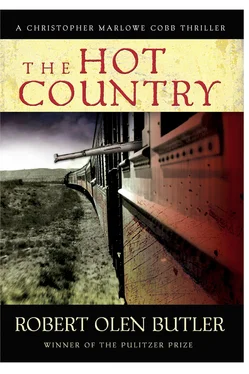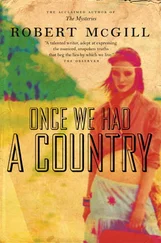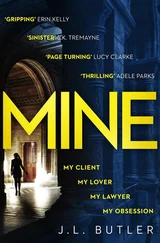As the door moved, the smells came out first, of mezcal and of potassium bromide — from his Kodak developer — and faintly of vomit. And the door was open: the room was large and in the center was a round table with a nearly empty mezcal bottle and Bunky’s face beside it, turned toward me, his eyes closed, his mouth open.
I stepped quickly to him and my passage was buoyed by panic, but as I drew near, I heard an upsurge of scrabbly, heavy breathing, and his mouth closed and opened and closed and then opened and stayed open as the sound of his stupor receded for a time.
I found myself glad he was drunk. Simply drunk. I did not like that first impression I’d had of him, though there was no reason for it. There was no reason for Bunky Millerman — even B. F. Millerman — to fear for his life in his rented room in Vera Cruz, Mexico. He was simply knocked-out drunk. This had to have started this morning. Maybe before dawn but not long before. Bunky was too experienced not to have slept it off by now if this was from last night. But he clearly still had some gutter-time left in him. His head and his arms lay flat against the table and a beer mug’s width of his butt clung to the edge of his chair and the rest of his torso stretched between, over empty air, all in perfect balance. Perfect for the moment. But it was clear what I should do.
“Come on, Pops,” I said, and I dragged him upright. He was almost no help, barely shuffling his legs, but I got him to the narrow bed in the corner and I laid him out there on his side. I got his shoes off and his tie off and he instantly rolled onto his back to mutter and gag a few more breaths until his breathing dissolved into a rattling snore.
I took the chair he’d been clinging to and dragged it to a spot beside his bed. I sat. If there was food in his stomach, there was a chance he’d throw up. If he did that on his back — and it seemed to be his oblivious preference — he could choke to death. I was not going anywhere for a while.
It was okay. I could think some things out. But the first thing I thought about was Mother teaching me how this could happen, this thing that would keep me at Bunky’s bedside for the next few hours, though this had been an unspoken corollary lesson, not the one she was actually intending. She sat me down the night I had my first taste of beer, from an obliging rummy on the back alley steps of the Nathan Hale when I was maybe thirteen, while she was somewhere in the third act of Macbeth at the Bowdoin Square a couple of blocks away. She smelled it on my breath that night, and with all the Isabel Cobb theatrical flair she told me the harrowing tale of how a splendidly handsome leading man, whose name she withheld, died just like that in his prime, in a bed, on his back, choked to death on his own vomit, and how that man had begun with a beer in an alley as a boy. She wept what seemed to be undramatized tears.
My mother was my teacher in most things. I spent some time in formal schools as I grew up, when she did a stint of repertory now and then or took a few months off between seasons, but mostly I read my way through a thousand books. Indeed, over those learning years, it was probably closer to three thousand, from Aristotle to Shakespeare to Henry James, most of which she chose. And she sat up late with me, still smelling faintly of greasepaint, making me write and talk and write and write, and she got various actors and actresses with various bodies of knowledge or flairs or actors’ skills — Medieval history or plane geometry or bare-knuckle Queensbury fighting or fencing or whatever else — to teach me what they knew. And as the occasions arose, she would perform these intense dramatic monologues of life’s hardest-won lessons, performances for an audience of one, usually at the end of a night, by candlelight or by gaslight, or sometimes whispered in the dark.
So this little harrowing tale of the death of a leading man was not unusual. But there were certain gaps in my mother’s education of me. And this tale was harrowing in a way she did not intend. I said, almost at once, “Was that my father?”
The question surprised me as much as it did her.
Not that I hadn’t asked it in one way or another before. But over the years she worked her way from my being brought by the stork to being found in the bulrushes of a Louisiana swamp to being conceived like Perseus from a shower of gold until she simply put me off with its being a sad story that she’d tell someday and wasn’t she plenty of parent on her own. But it always seemed to take us both by surprise when it came to my mind and out of my mouth.
And this time she did what she did the last time I asked. After a moment of silence, when I presumed she was forced to think of things that to this day I know not of, she clapped a hand onto her chest and did a stagy pre-swoon.
And this time I wasn’t having any of that.
“If you don’t want to drive me to drink,” I said, “you need to tell me the truth.”
The hand unclapped from her chest and the imminent swoon evaporated and she looked at me. “What have you been reading?” she demanded.
It was true that among the near three thousand books of my life with Mother, there were some contraband titles, and I’d just challenged her from the plot in a penny romance I’d recently found abandoned in a dressing room. But I wasn’t letting her divert me.
“The book of life,” I said to her.
“Oh, balderdash,” she said. “That’s bad melodrama.”
“Our life together is bad melodrama,” I said, learning the lesson, on this very same evening, that a couple of drinks can enhance one’s argumentative powers.
The hand clapped back onto her bosom.
“You’re not going to swoon, Mother,” I said.
The hand fell once more and her face collapsed into sincere concern. “Have I lost my credibility?”
“If I were beyond the footlights, not at all,” I said. “But I am here before you in our rooms.”
“And you are drunk,” she said.
“In vino veritas,” I said.
“Vino, my dearest, not beer.”
I recognized her tricks. I had to focus. “Was that my father?”
“No.”
“Who is my father?”
“Dead,” she said, swiftly, firmly. She hesitated and I knew what her mind was searching for.
“Quote me no Shakespeare or Marlowe or anyone now,” I said. “Just tell me his name.”
“Cobb.”
“What Cobb? Who was he?”
“He is a dead Cobb. A Cobb whose kernels have been gnawed away utterly. My darling, he had some good things about him that are showing up in you and some bad things that you show not even the merest trace of, for which I am profoundly grateful and largely responsible.”
“What good traits?”
“Your devastating good looks. Some aspects of them.” And she put her two hands on my two shoulders and she is a splendid actress, but not, I think, from less than twelve inches, which is how closely she had brought her face before mine. And even from this distance she seemed to be on the verge of real tears, and she said, quite low, quite unaffectedly, “Can we please leave it at that, my darling? This is very painful to your mother and there is no reason for me to live all that over in telling you and no reason for you to carry these same painful memories for the rest of your life in that lovely brain of yours. For both our sakes, would you please trust me and leave it at that?”
I could say nothing but yes.
And Bunky began to mutter in his sleep.
Just sounds. Nonsense words.
I put a hand on his shoulder. I rustled him a little. “It’s okay, old man,” I said. “Sleep it off.”
And he grew quiet.
But he had me thinking now about Mensinger’s cryptic words, which was what I should have been focused on anyway. I could see the list clearly in my head and I started with the first words.
Читать дальше












